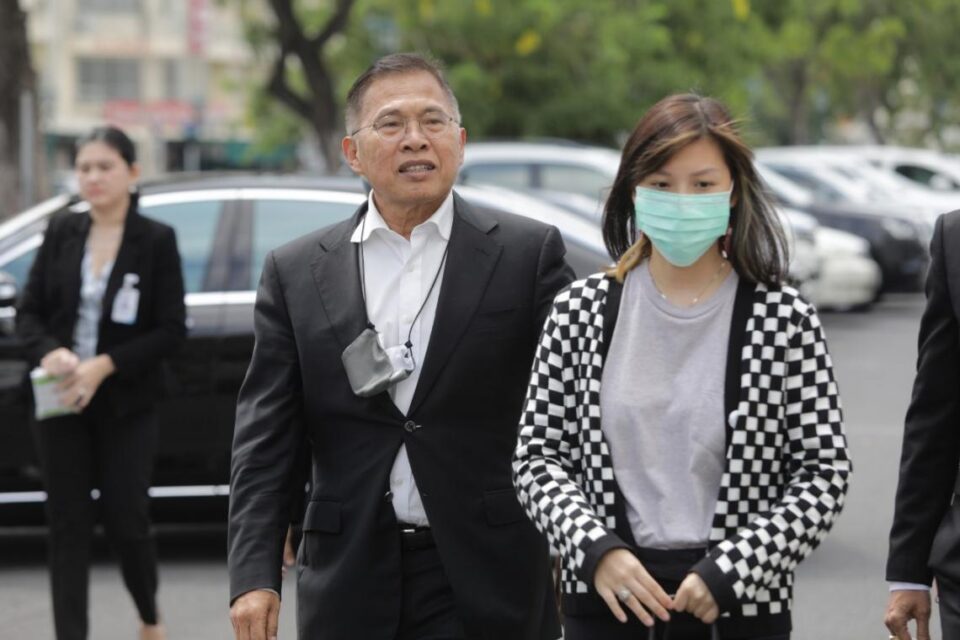Watana Muangsook has become the latest Thai political heavyweight to be jailed in a high-profile corruption case.
On March 4, the Supreme Court’s Criminal Division for Political Office Holders upheld a September 2020 verdict that found him guilty of power abuse in connection with the Ua Arthorn low-cost housing project when serving as social development and human security minister in Thaksin Shinawatra’s government.
The court confirmed its 99-year prison term handed down for 11 counts of corruption, including abuse of power and demanding bribes. However, Thai law sets a maximum prison term of 50 years.
He and six other defendants were also ordered to pay a total of Bt89 million in compensation to the state.
Watana, 64, graduated with a bachelor’s degree in law from Chulalongkorn University and began his career as a lawyer in 1982. One of his clients — Pachara Chearavanont, the daughter of a senior CP Group executive — eventually became Watana’s wife.
Watana entered politics in 1996, elected as an MP under the Chart Pattana Party in his home province of Prachinburi. In 2000, he joined Thaksin’s Thai Rak Thai Party and served in multiple Cabinet posts under his government.
In 2011, Watana became a party-list MP for Thaksin’s proxy Pheu Thai, which won the general election and ruled for almost three years before being toppled by the May 2014 coup. He left Pheu Thai last year to join Thai Sang Thai, a new party led by fellow former Pheu Thai heavyweight Khunying Sudarat Keyuraphan.
Ambitious project
The Ua Arthorn low-cost housing project was envisioned by then-PM Thaksin as a tool to “rid Thailand of slums” while easing the problem of public land encroachment and improving the quality of life for people earning low incomes.
In 2003, Thaksin’s Cabinet approved Bt1 billion in state subsidies for the Bt2.5-billion project to build 1 million apartments and houses across the country, so that each unit could be sold at Bt400,000 to Bt700,000.
After Thaksin’s government was overthrown in the 2006 military coup, the Assets Examination Committee (AEC) was set up to investigate its alleged irregularities. The panel concluded that Bt82.6 million from the project’s contractor was paid to Watana through the bank accounts of rice trader Apichart Chansakulporn’s employees.
Apichart, who is also known as “Sia Piang”, was sentenced to 66 years though he will also serve a maximum of 50 years. The wealthy businessman is currently serving a 48-year prison term for his role in the bogus government-to-government rice deals under the government of Thaksin’s sister Yingluck.
The AEC findings were passed on to the National Anti-Corruption Commission, which in 2016 resolved to send the case of Watana and 13 others to the Office of the Attorney-General.
High-profile convictions
Over recent years, many prominent politicians — most of them linked to Thaksin — have been either sentenced to jail or escaped the hand of the law for corruption.
Thaksin himself has lived in self-exile overseas since 2008 after the Supreme Court sentenced him in absentia to two years in jail. Thaksin was found guilty of power abuse over his wife’s purchase of a coveted Bangkok plot from a government agency at a price far lower than the market value.
The court also found him guilty in three other corruption cases stemming from his time in power and handed down a combined term of 10 years.
In September 2017, Yingluck was sentenced by the court in absentia to five years in jail for negligence, in connection with her government’s corruption-plagued rice-pledging scheme, estimated to have wasted Bt500 billion in the state budget. Yingluck is also living overseas after fleeing just before the verdict was read.
A month earlier, the same court had found two of Yingluck’s Cabinet members and several senior permanent officials guilty of corruption over fabricated contracts for sales of government rice stocks to Chinese state agencies.
Her commerce minister Boonsong Teriyapirom received 42 years in jail while his deputy Poom Sarapol was sentenced to 36 years. However, both jail terms were cut sharply by the Corrections Department last year, sparking public uproar.
In September 2013, the top court sentenced Thaksin’s deputy interior minister Pracha Maleenont in absentia to 12 years in jail for malfeasance in connection with the Bt6.6-billion purchase of overpriced fire trucks and boats.
In June 2016, former agriculture minister Chucheep Harnsawat, who was an executive member of Thaksin’s Thai Rak Thai Party, was sentenced by the court to six years behind bars for malfeasance in connection with dishonest fertilizer purchases.
Two months later, the court sentenced Surapong Suebwonglee, the information and communication technology minister in Thaksin’s government, to a year in jail for malfeasance.
He was found guilty of endorsing revisions to concession contracts that would benefit Shin Corporation and Shin Satellites, which were owned by Thaksin’s family.
By Thai PBS World’s Political Desk





